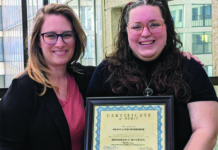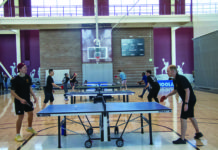The top priority for every student should be their mental health.
Students have to deal with the stress of moving around to dorms or apartments, starting classes, making new friends and getting into a routine. While focusing on all of this, some may start to let self care habits slip. If this happens, there are many resources on campus to help get students back on track.
Aryanna Farabee is the president for the National Alliance on Mental Illness (NAMI) at Colorado Mesa University. The club’s goal is to not only spread awareness about mental health, but to give each student the chance to reach out and get help when needed.
“For students to reach out and seek mental health help, I would encourage them to first identify someone around them whom they trust. That can be a professor, a coach, an RA, etc. It takes a lot of courage to get help for yourself especially when you feel as if you are at your weakest point. Finding someone you trust to talk to can help you figure out if you need to take further steps in receiving professional help as well,” Farabee said.
Departments such as Student Success and Engagement can also help with mentoring students and giving them a place to go that does not necessarily have to be a therapist. However, there are therapists available on campus through the Wellness Center.
Farabee stated that in her time at CMU, there has been a huge shift in mental health. With COVID-19 putting classes online, students did not get face-to-face interactions that we all need as humans. Farabee noticed that rates of mental illness were skyrocketing while the outreaches for help fell drastically. Part of NAMI’s goal is to get those students the help they need.
“On CMU campus, I have taken note that many students seem to feel more alone, sad, angry, stressed, and anxious than ever before. Although online there is normalization of mental health awareness, in-person, its almost like students now assume that their serious depression, or anxiety is normal and that “everyone feels that way, so I don’t need help”. Something to keep in mind with this cultural attitude, is although depression, anxiety, stress, etc. is common, that doesn’t mean that when it occurs you have to keep it inside and muscle through it. Especially not by yourself,” Farabee said.
There have been initiatives on campus to help students. Last Spring, there was a Campus Climate Survey that identified the needs of students so that administration can actively make changes that will make it easier to reach out. The lead on this project was Dr. Nikki Jones, a former psychology professor and long-time mental health advocate. Jones is still working on creating an environment where students can reach out with ease.
“The whole premise of our approach to mental health is to create a healthy campus by promoting ways for students to become more resilient. We will do this by pushing out many different posters, and infographics, resources for students, and positive ways to cope with different stressors. A few events that are coming up soon this September is our documentary “Happy” that we will be showing on September 6th in the CMU ballroom at 6:00 pm,” Farabee said.
The movie will follow a man who travels the world asking for definitions of happiness from a plethora of people. Following the showing, there will be a panel discussion where students can talk about what they got from the documentary.
NAMI also encourages students to get involved by attending meetings where they can foster their own ideas for the wider campus community. Besides events on campus, the club also does a large amount of outreach within Mesa County that students can join in on.






